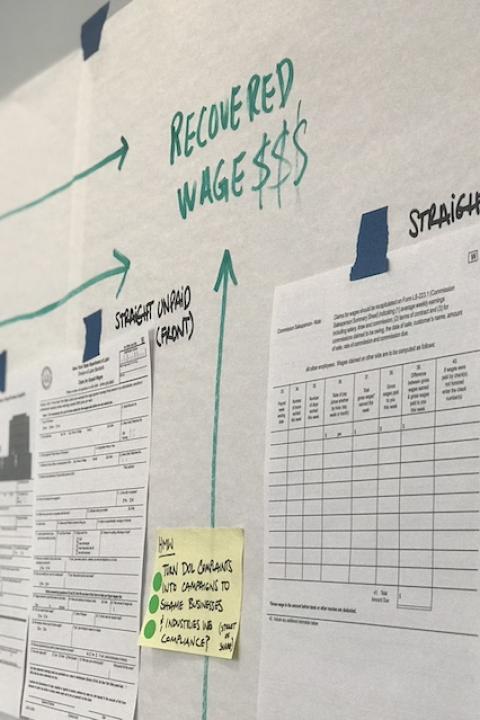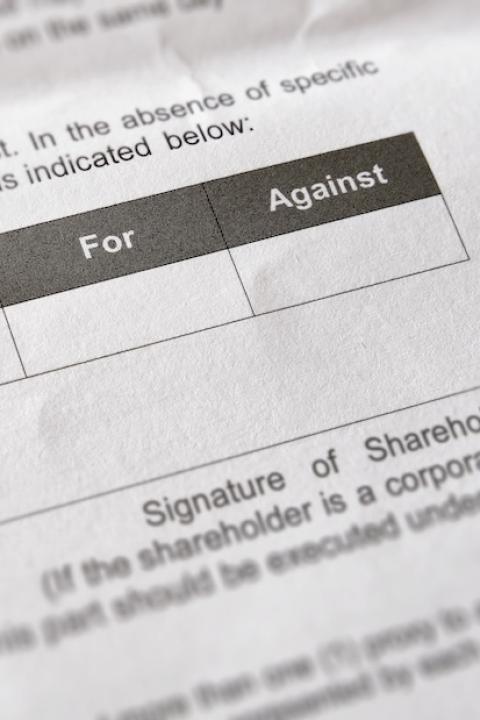
With the 2023 proxy season in the rear-view mirror, financial analysts noted a sharp decline in shareholder support for environmental, social and governance proposals. However, anti-ESG proposals also failed to stick, and signs of an ESG resurgence are already beginning to emerge.
Mixed support in the 2023 proxy season
Most U.S. companies hold proxy sessions between April and June, enabling shareholders to vote on issues without being present.
Based on the outcome of the 2023 season, shareholders seem to be losing interest in ESG issues. In a June analysis, the firm FTI Consulting noted that “2023 has seen investors support significantly less environmental and social proposals than in past years.”
The question is whether or not the drop-off marks a permanent trend or a temporary reaction to current events. FTI attributed much of the decline to the “anti-ESG" agenda, explaining: “The scrutiny on institutional investor vote behavior…by the anti-ESG activists has caused institutional investors to support less environmental and social proposals in 2023.”
At the same time, anti-ESG proposals also failed to garner much support from shareholders over the past five years, the analysis found. FTI advised that other factors can also have a significant influence on ESG support. Analysts cited the 2022 proxy season, which also saw a drop in ESG support after a rules change by the U.S. Securities and Exchange Commission. The change fostered a spike in the number of prescriptive proposals to come up for a vote, and prescriptive proposals generally receive low support from shareholders regardless of their subject matter.
We don’t talk about ESG, but we do it
One area where the anti-ESG movement has clearly had an impact is in the way in which bankers, money managers and other financial stakeholders communicate. Many continue to put the principles into action while avoiding specific references to ESG, as shown by a recent Bloomberg survey.
“About two-thirds of respondents in a survey of roughly 300 Bloomberg terminal users said the anti-ESG movement that started in the U.S. last year will force firms to stop using those three letters in conversations with clients,” Alastair Marsh and Lisa Pham of Bloomberg observed last month. “However, they’ll continue to incorporate environmental, social and governance metrics in their business."
Financiers under fire
The Bloomberg analysis is among those attributing ESG avoidance to an aggressive, partisan political environment of legislative and legal attacks on ESG investing.
Though the issue seems to have failed to gain traction among voters, fossil energy stakeholders have been credited with motivating Republican office holders to act. Their efforts reportedly include model bills created by the American Legislative Exchange Council (ALEC), which has established a right-wing reputation with an emphasis on protecting fossil fuels.
“The finance industry is now grappling with a second year of attacks on ESG by key members of the Republican Party, including threats of litigation from state attorneys general, as well as outright bans on the strategy in some U.S. states,” Marsh and Pham of Bloomberg noted.
The attacks prompted one of the highest-profile proponents of the ESG investing movement, BlackRock CEO Larry Fink, to stop using the acronym altogether.
"I don't use the word ESG any more, because it's been entirely weaponized ... by the far left and weaponized by the far right," Fink told a gathering at the Aspen Ideas Festival last summer, as reported by Reuters. In the same speech, he reaffirmed BlackRock’s commitment to discussing decarbonization, corporate governance and social issues with the companies in its portfolio.
Financiers fight back
Despite the political headwinds, financial stakeholders continue to act in support of social and environmental principles. Part of the effort is happening behind the scenes, as financial stakeholders seek to convince legislators that anti-ESG bills will result in financial harm to their states.
In a recent analysis, S&P Global identified 12 states in which Republican legislators “successfully pushed anti-environmental, social and governance legislation across the finish line.” In all, 19 states now have one or more anti-ESG laws on the books.
That may seem like a substantial gain, but the legislative failures outweighed the successes. “Many anti-ESG bills introduced in 2023 … failed after chambers of commerce, banking associations and public pension officials raised concern over costs or free market principles,” S&P observed.
In addition, only four of the 25 new anti-ESG laws to pass this year remained intact by the time of the August analysis. The other 21 were substantially revised to protect state pension funds. S&P cited Indiana and Texas as examples, both of which would have faced billions in losses over 10 years without the revisions.
Taking it to the courts
Financial stakeholders are also taking their case to court. For example, last month the Securities Industry and Financial Markets Association (SIFMA) — an industry group that counts BlackRock among its members — moved to challenge new Missouri rules on ESG documentation.
The rules went into effect on July 30. As described by SIFMA, they stipulate burdensome documentation that no other state requires. SIFMA argues that the new rules put Missouri in direct conflict with the 1996 National Securities Markets Improvements Act, under which states cannot preempt standard federal record-keeping rules.
“Under existing federal securities laws, broker-dealers and investment advisers are already required to provide investment advice that is in the best interest of their customers," the group argued as it announced the suit. "The Missouri rules are thus unnecessary and create confusion."
The climate factor
New reporting rules established by the European Union may also motivate U.S. companies to continue making progress on ESG principles, regardless of what's happening at home.
The new EU Corporate Sustainability Reporting Directive became effective last January. “This new directive modernizes and strengthens the rules concerning the social and environmental information that companies have to report,” the European Commission's website reads. The new rules cover large companies as well as small and midsized companies.
In June, the Republican-led ESG Working Group in the U.S. House of Representatives released an interim report that recommended protecting U.S. companies from “burdensome EU regulations.” However, Republican leadership will have a hard time reconciling protectionism with their party’s longtime support for free market principles.
The anti-ESG movement is also floundering on the national stage. Surveys routinely reflect public support for ESG principles. Moreover, high-profile Republicans aren't helping the case.
The hapless presidential campaign of Florida Gov. Ron DeSantis is one example. Among other issues, the Republican governor has cultivated a reputation for opposing ESG investing, highlighted by a high-stakes legal feud with Florida’s top employer, Disney, over LGBTQ rights.
Another example is the looming impeachment of Texas Attorney General Ken Paxton, a prominent anti-ESG Republican, on charges of corruption and bribery. His wife’s reported involvement with a shell company has raised additional questions about allegiance to the principles of fiduciary duty.
Looming over all this is climate change, a factor from which Florida, Texas and other anti-ESG states are hardly immune. With the exception of fossil energy stakeholders, the rising threat of climate risks will continue to influence and motivate corporate behavior regardless of the outcome of the upcoming 2024 proxy season.
Image credit: Justin Luebke/Unsplash

Tina writes frequently for TriplePundit and other websites, with a focus on military, government and corporate sustainability, clean tech research and emerging energy technologies. She is a former Deputy Director of Public Affairs of the New York City Department of Environmental Protection, and author of books and articles on recycling and other conservation themes.














